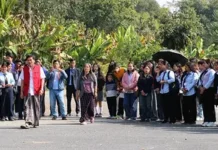ZIRO, 19 Jun: Lower Subansiri Deputy Commissioner Somcha Lowang, along with MoRTH Team Leader Sheo Balak Singa, Structural Engineer Haracha Singh, Residential Engineer Bhairav Deori, RWD Executive Engineer Gambi Karbak, Ziro Highway Division AE Hibu Tade, representatives of Puna Hinda Construction Company and others on Friday inspected the construction of the retaining and breast walls, culverts, drains, etc, in Pamluk area under Package 2 of the Trans-Arunachal Highway (TAH) project.
The site inspection and quality checking of materials being used was initiated by the DC in the wake of a video going viral on social media regarding ordinary mountain soil being used by the masons in the construction work, leading to lodging of a complaint by the All Lower Subansiri Youth Association.
During the site inspection and quality checking, the MoRTH engineers identified and certified that stone dust, a byproduct obtained from stone crushers, has been used in places where the best quality sand is not available.
Stone dust is a waste material obtained from crusher plants. It has the potential to be used as partial replacement for natural river sand in concrete. Use of stone dust in concrete not only improves the quality of the concrete but also conserves the natural sand for future generations, they said.
The MoRTH team leader further informed that, although stone dust is permitted for structural and masonry work, a few requisite tests are invariably conducted prior to allowing use of stone dust.
“As far as the durability tests are concerned, cubes cast from stone dust have been found conforming to the specifications as laid in the specifications of roads and bridges manuals of MoRTH”, he informed, showing the test results and the RFI of the structures.
Heavy construction machineries have already been plying over these culverts for more than five months, carrying heavy loads successfully.
Interacting with the contractor, the DC directed the sub-contractors to adhere to the quality standards set by the agencies.
She further called for “responsible journalism without any prejudice” and appealed to all the “social media journalists” to play a constructive role in the developmental process. (DIPRO)


